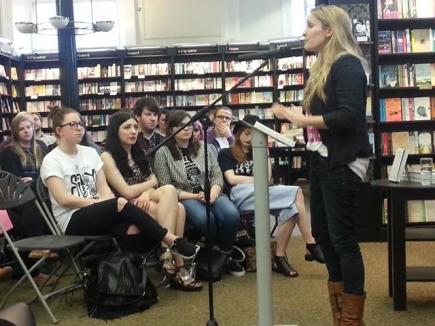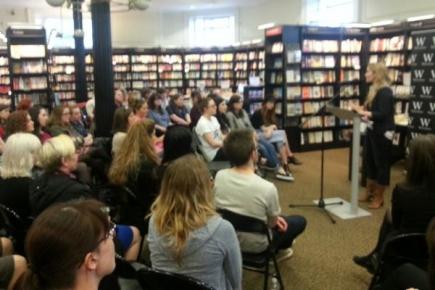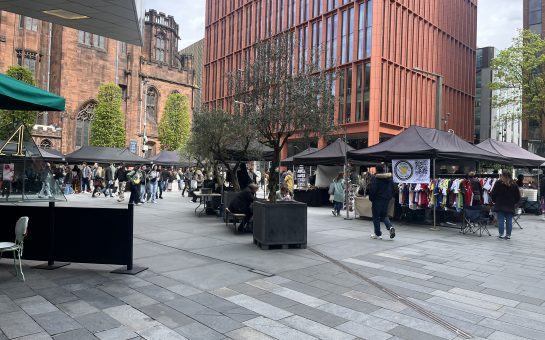“When I stood up and said I was being groped, everybody on that bus looked out the window.”
Two years ago Laura Bates was on a bus when a man decided to put his hands where they weren’t wanted.
Her fellow passengers ignored her cry for help but this was one incident too far for the young journalist and actress. She decided she just had to speak out.
An accumulation of random events in a very short space of time, from catcalling to more serious unwanted touching, suddenly made her question why she felt she had to ignore them.
It spurred her on to begin the Everyday Sexism Project and last month she released a book, Everyday Sexism.
The project has helped her address some of the casual, and not so casual sexism which women encounter on a daily basis.
During the project, she began working with the British Transport Initiative, and as a result she revealed the reporting of sexual offences on public transport had increased by 26%, and the detection of offenders has also risen by 32%.
Throughout the project she talked to numerous women and was amazed and dismayed at the sheer number of similar stories she heard.
She was stunned to discover the number of women who were just resigned to putting up with what were, at worst, things that were illegal or, at best, made them extremely uncomfortable.
“We have been into countless universities and had reports back from students who’ve reported sexual assaults for the first time because they didn’t realise they had been assaulted, they didn’t know what the law was,” she told MM.
“In most cases, the women never told anyone. They were just used to it and it made me start wondering why women were so used to it and why it was so normalised.
“People said sexism doesn’t exist anymore, women are equal now, it’s not an issue and that just made me realise that there was this gulf between this general conception that sexism is no longer a problem and the reality of what women were still facing and it was trying to bridge that gulf that made me start the project.”
Little did she know just how big and impactful that project would become.

STAND UP: Laura said a number of women are resigned to putting up with everyday sexism
With 143,000 Twitter followers and more than 60,000 accounts of gender discrimination on the website, it seems sexism is not just a relic from the 1970s.
But feminism’s days of bra burning are over, with young women today more likely to take them off to pose topless for lads’ mags.
So what is sexism today and how can we release society from the insidious stronghold it has over us?
Laura explained: “For me, sexism is simply treating somebody differently or discriminating against them because of their sex.
“I think it’s important too that we take into account the fact that this is something that disproportionately impacts on women.
“The frequency and severity of incidents for women is greater.”
She added: “This just isn’t about men versus women, it’s about people standing up to prejudice. I think gender equality does impact negatively on men too in a number of ways.”
Comments on the site make for grim reading, from rape to threats of rape to less serious but still undeniably sexist comments, the accumulative effect of which can be seriously damaging.
Laura herself has been the target of a vast number of abusive messages.
She described how support from family and friends as well as the online feminist community got her through what was sometimes hard to deal with.
She explained: “The messages very quickly escalated into really graphic and detailed death threats, rape threats, threats against members of my family, long emails about how I should be murdered and how I should be raped, in what order with what weapons.”
Such abuse and threats are sadly not uncommon on the web, and many people who spend a large amount of time there may have experienced such abuse at some point first hand.
“The internet basically just reflects the misogyny that is inherent in our society,” she told MM.
“When I hear those comments from people saying ‘oh, just ignore it’, they haven’t necessarily had any idea how graphic and how threatening and terrifying some threats are that women are receiving online.
“Ironically that suppresses the freedom of speech of women who are then unable to use those online spaces.”
She added that she believed sexism is connected to misogyny and sexual violence and by allowing the more minor incidents to slide we are normalising the same attitudes and ideas at the root of the more serious offences.
The minor incidents are something which many women encounter on a daily basis.

EQUALITY: The Everyday Sexism Author says a cultural shift is needed
And while shouting ‘compliments’ in the street may seem harmless, their damaging effects can have a far greater impact.
“To me, a compliment is something you say with the expectation of it having a positive impact on someone and with the potential for perhaps some kind of interaction between you and them,” she told MM.
“When you shout a comment on a woman’s appearance in the street you’re not opening a dialogue, you’re not inviting any kind of interaction with her.
“You’re making a statement of power, essentially that you have the right to rate her out of ten or whatever it is and to tell her what you think.”
She adds that very often these ‘harmless’ incidents can and have quickly escalated into something far more sinister.
She said: “We hear from so many women who have tried to ignore one of these apparently harmless shouts and when they have either rejected it or ignored it, it has escalated into real aggression, often physical pursuit and even violence because of this sense of entitlement.
“You know, ‘well, who do you think you are, slut, not to answer me’.”
She added that many complaints about comments and wolf whistles came from girls in their school uniforms.
“You wouldn’t believe how many girls I’ve spoken to that say: well, actually, I get less now, now that I’m not nine or ten, that young,” she said.

UNITED: Laura poses with MM’s Danielle Roper
Disputing the myth that Britain is a nation where sexual equality reigns, she listed the worrying statistics that 85,000 women are raped in the UK every year, 400,000 sexually assaulted and over two women killed every week by a current or former partner.
Every six or seven minutes a woman is raped, she has a one in four chance of being a victim of domestic violence and a one in five chance of being a victim of a sexual offence.
She added: “In reality, the most serious human rights abuses are also happening to women here in the UK.
“Forced marriage is a problem, female genital mutilation – there are 20,000 girls under the age of 15 at risk of that in the UK every year. “
She also stressed the ‘real social acceptability of sexism in the UK’, stating as an example her recent visit to Australia, where people were ‘shocked’ and ‘outraged’ by the idea of page three.
She added: “Here you’re labelled a prude and frigid for trying to speak out against it because you’re so used to it.”
She emphasised the importance of teaching children from a young age how to respect each other, regardless of gender, and stressed the need for compulsory sex and relationships education.
“What we need now is a social and cultural shift, it’s a shift in ideas and attitudes and normalised behaviours and it has to be something that we all contribute to,” she told MM.
“I think attitudes can and do change but I think that it’s something that we need to get people on board with and to get people standing up and speaking out about when they see it.”
It was a comment that stuck in my mind when, on my way home, minding my own business, a group of teenagers treated me to a barrage of sexually explicit comments.
The ring-leader joked: “It’s just flirting, isn’t it?”



